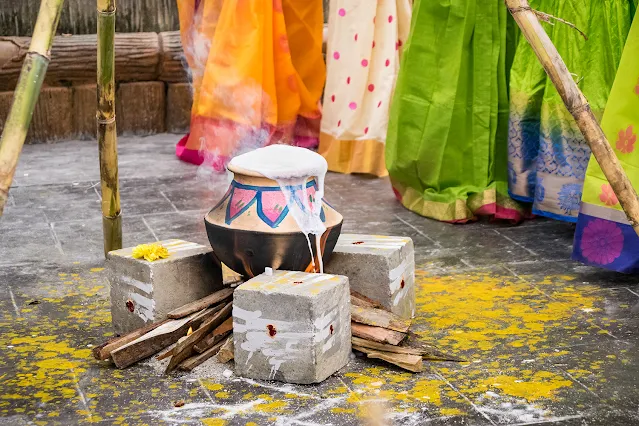Pongal or Thai Pongal, is a Tamil festival that is celebrated in the month of Thai and usually falls on January 14 (January 15 on leap years). Despite being lesser known and is often overshadowed by Thaipusam that occurs several days later, nevertheless it is an important festival to the Tamils as it celebrates Uttarayan, or the movement of the sun shifting back north after the end of its southward journey into the Tropic of Capricorn, thus marking the end of winter. Now you will say, hey this sounds like the Winter Solstice in December that is celebrated in many cultures, but why is it in January and not in December?
 |
| The pot of milk, rice and jaggery that is being boiled overflowing and accompanied by shouts of Pongalo Pongal during Thai Pongal festival. |
Well you are right, it is the Tamil/Hindu equivalent of the Northern hemisphere Winter Solstice but the reason for the date discrepancy is because Tamil/Hindu calendar and astrology are based on sidereal precession instead of tropical precession like the Western and Chinese calendar/astrology. Due to the precession of the Earth on its axis, the date when the Sun enters Tropic of Capricorn is seen by us today to be happening in Dec (usually Dec 21) instead of January. In 26000 years time from the start of the Tamil/Hindu sidereal calendar, then Winter Solstice will coincide with Thai Pongal again in January as the Earth makes a complete cycle wobbling on its axis.
This festival is also celebrated in the northern parts of India as Makar Sankrati, in West Bengal as Poush Sankrati or Maghe Sankrati in Nepal; and as well as wherever the Indian diaspora can be found. In Malaysia, where the local Indian communities whom are mostly Tamils, celebrate Thai Pongal with great fervour despite it being not a public holiday.
The day before Pongal is called Bhogi Pandigal (Bhogi or Pogi in short), and it is a day to get rid of old stuff and set it on fire, symbolically getting rid of the old and starting anew. On the day of Pongal, Tamil families would first set up a tripod of three sugarcane sticks, and beneath it a new, colourful earthenware pot (pongapani) wrapped with a stalk of turmeric plant (leaves, stem and a bit of the root; some people wrap it when the cooking is almost done as to prevent it from being completely burnt), is used to boil rice with jaggery and milk, then topped with spices, nuts and dried fruits (eg. cardamom, cinnamon, cashews and raisins) and are allowed to boil over and the liquid bubble out of the pot.
When that happens it is customary to shout Pongalo Pongal to usher in auspiciousness for the new year. Once the cooking is done, the resulting sweet rice dish (called sakkarai pongal - literally sweet pongal) is then offered as prasadam to the Sun God (Surya) and other deities first and later consumed by family members.



No comments:
Post a Comment